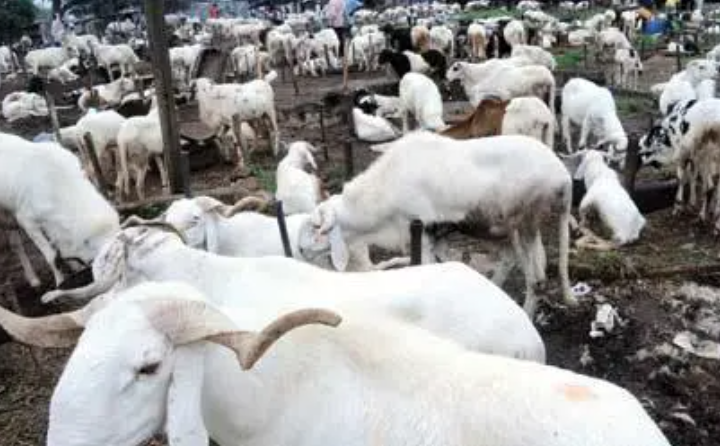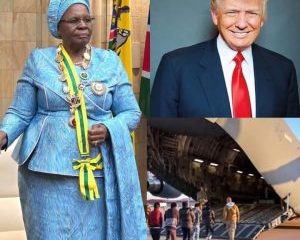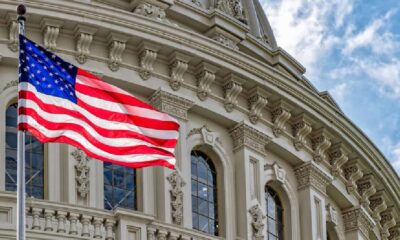News
Sallah: Ram traders decry low sales amidst high prices, insecurity

As the countdown to Sallah festivities narrows, ram sellers across the country are currently grappling with a disturbing trend of low patronage.

Their voices showed frustration and worry as they attributed the slow patronage to a combination of economic challenges, spate of insecurity, and transportation costs for the animals sourced from northern Nigeria.
The PUNCH reports that some ram sellers in Ogun, Lagos, Gombe, Bauchi, Nasarawa and Sokoto states, observed the high prices of the rams ahead of the forthcoming Sallah celebration.
A cattle trader, who spoke with Sunday PUNCH at Ibafo, Obafemi-Owode Local Government Area, Ogun State, Ibrahim Yusuf, explained that a big ram was sold between N500,000 and N700,000 with the least sold for N250,000.
Yusuf said, “Rams are so costly this year and the reason for it is the insecurity in the North. We no longer get rams there anymore. We have to travel to Mali most of the time to get the rams and the money we spend in that process is contributing to the huge prices”.
In Arepo, also in Ogun State, another trader who identified himself only as Muhammed said, “The effects of the activities of insurgents, banditry among others contributed to the surge in the prices of the rams as the supplies from the region had gradually reduced.
“The profits we make now are meagre compared to the amount we always spend on getting the rams here from Mali. Rams are very expensive this year and they are between N300,000, N650,000, depending on the size”.
Another seller in the Ijaiye area of Lagos, who refused to give his name, said, “Prices of ram are high now. You know what is happening in the country these days. The smallest ram here now is N300,000.
“Though if you have N200,000, I can still find one for you, generally, in this place, we have rams of N400,000, N600,000 and N800,000. It is not our fault. The cost of transporting the rams to Lagos is another thing, but there is nothing we can do about that”.
In Gombe State at Tike market in Pantami, a seller, Dan Garba, said, “Now, we have N800,000 ram, but last year, we sold the same size between N350,000 to N450,000. The cheapest ram here is N150,000 only. It’s not our fault; that (N150,000 ram) was the ram we sold for N75,000 last year”.
Another trader, Sultan Abubakar, stated, “Customers are not coming to buy. If customers don’t come, how am I going to take care of my family? I can’t sell below cost price. I will not realise my money”.
Similarly, in Kasuwar Shanu, Bauchi State, Olaniyi Musa, who said he bought and distributed rams to southern states (Oyo, Ogun, Ibadan, and Osun), claimed that the inflation in the country also affected animal prices.
Olaniyi maintained that the turnout of buyers this year was very low.
He said, “Compared to last festival season, the price of animals has skyrocketed. The inflation rate and shortage of rain have a significant impacted on the prices of the animals. Last year, we bought the animal at the lowest price of N40,000 to N45,000 while this year the lowest price is N100,000”.
On his part, the Treasurer of the Association of Buyers of Animals and Animals Feeds, Bauchi chapter, Zakariya Mato said rams were selling at the prices of N400,000, N300,000, N200,000 and N100,000.
He said, “There was a reasonable increase in the price compared to 2023 as the prices of animal feeds were also affected by inflation. The low turnout of buyers is not unconnected with the traditions in Bauchi State that the buyers arrive at the market two to three days before Sallah to buy the animal to avoid theft at home”.
In the same vein, Dahiru Garba who is also a cattle seller in the Bauchi market said, “Last year by this time my customers from Kano, Kaduna, Katsina, and other northern states were calling me on the phone to send animals to them”.
Buyers bemoaned the increased cost of the rams.
One of the buyers, Hassan Ismail, said that a medium-size ram that was sold for about N70,000 last year was now between N110,000 and N120,000.
He said, “It is disheartening that the price of these essential items is getting this high daily, how can an ordinary man celebrate this Sallah with this situation of things for God’s sake? I don’t think I will buy any Ram”.
Another buyer, Shamsudeen Ibrahim, said, “I have already made up my mind not to buy anything this year. I cannot kill myself or where do I have close to N200,000 to buy Ram this year? I will explain to my children and I am sure they will understand as times go this year”.
Also speaking, Abubakar Salami, who sells cattle in the market, said the market situation this year was bad when compared with what it was last year.
News
Presidency slams El-Rufai over plot to woo Buhari

The Presidency and the ruling All Progressives Congress have dismissed the prospect of any opposition coalition unseating President Bola Tinubu in 2027, describing recent moves by former Vice President Atiku Abubakar and ex-Kaduna State Governor, Nasir El-Rufai, as futile and politically opportunistic.
Their reactions followed the high-profile visit by Atiku and El-Rufai—accompanied by former governors Aminu Tambuwal (Sokoto), Gabriel Suswam (Benue), Jibrilla Bindow (Adamawa), and Achike Udenwa (Imo)—to former President Muhammadu Buhari at his Kaduna residence last week.
Although Atiku maintained the visit was merely a post-Sallah courtesy call, political observers and members of the ruling party believe it was part of broader opposition coalition talks aimed at weakening Tinubu’s political base.
“There is a plan for the major political parties to come together and form a strong opposition. But it is not part of our visit,” Atiku told reporters.
In recent weeks, concerns have risen within the APC over speculated coalition efforts and the potential exit of the Congress for Progressive Change bloc from the party, following defections to the Social Democratic Party.
But the APC’s National Secretary, Senator Ajibola Bashiru, waved off the speculations in a phone interview with The PUNCH, questioning the credibility of the so-called CPC defection narrative.
“It is not true. Which CPC bloc did you people say is leaving? Was El-Rufai or Atiku a CPC member? Is our Vice National Chairman (North-West), Garba Datti Mohammed, and even former Governor Al-Makura not in the CPC? Have you heard any of them saying he is leaving?” Bashiru queried. “I don’t know why the media keeps giving these sorts of people unnecessary attention.”
Also reacting, President Tinubu’s Special Adviser on Policy Communication, Daniel Bwala, criticised the coalition talks, dismissing them as a desperate power grab by political misfits with no shared ideology.
“This coalition is an association to grab power,” Bwala said. “That’s why you will hear Peter Obi say they are only there to grab power. Tomorrow, he will say he is considering joining. As for my senior brother, El-Rufai, I like what he is doing. He is using them to play ping pong.”
Bwala added that internal resistance within the Peoples Democratic Party had already disrupted El-Rufai’s attempts to lure the opposition into the SDP.
“When El-Rufai came, he thought he would move all of them to SDP. But His Excellency (Sule Lamido) screamed, ‘Hold it there!’ He reminded them that it was the PDP that made El-Rufai minister twice and gave him political relevance. Now, he wants to drag them out? We’re not going anywhere,” Bwala recounted.
The Presidency insists that despite the rising political noise, President Tinubu remained focused on governance and would not be distracted by alliances it described as unstable and self-serving.
Credit: PUNCH
News
Court dismisses suit seeking Oyo monarch’s removal

An Oyo State High Court sitting in Ibadan has dismissed a suit contesting the nomination and installation of the Olugbon of Orile Igbon, Oba Francis Alao.
In his ruling on Monday, Justice K.A. Adedokun nullified the case for lack of jurisdiction.
Four members of the Akingbola family who instituted the suit contested the selection, appointment, and approval of Oba Alao as the Olugbon.
Justice Adedokun held that the court lacked the jurisdiction to entertain the matter, saying that the claimants had no locus standi to file the suit.
He ruled that the case was defective as it failed to include Surulere Local Government, the authority legally empowered to initiate the selection process and approve the traditional ruler’s appointment.
Oba Alao, whose installation as Olugbon was ratified by the Oyo State government and traditional institutions, is the current vice chairman of the Oyo State Council of Obas and Chiefs.
News
EFCC arraigns Chinese for giving false information in Lagos

The Economic and Financial Crimes Commission (EFCC) has arraigned a Chinese, Liu Beixiang, over alleged false information to an officer of the agency.
Liu was arraigned yesterday before Justice Ayokule Faji of the Federal High Court sitting in Ikoyi, Lagos.
The charge reads: “That you, Liu Beixiang (a.k.a Lao Liu), sometime in December 2024 in Lagos, within the jurisdiction of this honourable court, did give information, which you knew to be false, to an officer of the Federal Government of Nigeria in the discharge of his duties and thereby committed an offence contrary to Section 16 (1) of the Economic and Financial Crimes Commission (Establishment) Act, 2004.”
The defendant, however, pleaded not guilty to the offence when the charge was read to him. In view of his plea, the prosecution counsel, Babatunde Sonoiki, asked the court for a trial date and also prayed that the defendant be remanded in a correctional facility.
But in his response, the defence counsel, F.A. Dalmeda, informed the court of an application submitted to the EFCC seeking a plea bargain.
“We filed an application for a plea bargain, and we also filed a motion for bail, which the EFCC responded to this morning.
“We need a date for us to report on the plea bargain.
Consequently, Justice Faji adjourned the matter till June 23, 2025, for a report on the plea bargain and remanded the defendant in a correctional centre.
-

 News19 hours ago
News19 hours agoJust in: Namibia Moves to Deport Over 500 Americans in Bold Visa Policy Shift
-

 News20 hours ago
News20 hours agoRivers women rally in support of state of emergency
-

 News15 hours ago
News15 hours agoYou must refund N300m, Rivers State tells NBA
-

 Politics18 hours ago
Politics18 hours agoBwala accuses Senator Ndume of plans to defect from APC
-

 Foreign15 hours ago
Foreign15 hours agoUS orders 30-day registration for all foreign nationals or face jail, deportation
-

 News20 hours ago
News20 hours agoSoldiers rescue 16 kidnapped passengers in Plateau
-

 News2 hours ago
News2 hours agoPeter Obi speaks as Benue govt. blocks humanitarian visit
-

 News19 hours ago
News19 hours agoGunmen invade Plateau community in fresh attack, Kill 40 People





